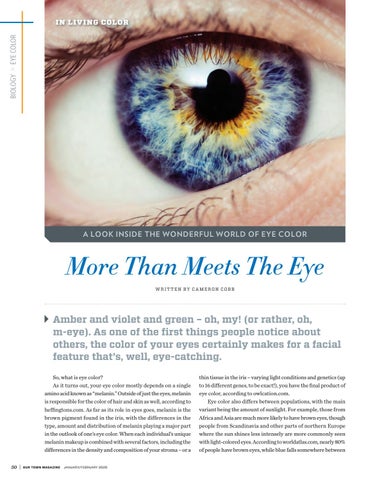50
BIOLOGY >> EYE COLOR
IN LIVING COLOR
A LOOK INSIDE THE WONDERFUL WORLD OF EYE COLOR
More Than Meets The Eye W R ITTEN BY CA MERON COBB
Amber and violet and green – oh, my! (or rather, oh, m-eye). As one of the first things people notice about others, the color of your eyes certainly makes for a facial feature that’s, well, eye-catching. So, what is eye color? As it turns out, your eye color mostly depends on a single amino acid known as “melanin.” Outside of just the eyes, melanin is responsible for the color of hair and skin as well, according to heffingtons.com. As far as its role in eyes goes, melanin is the brown pigment found in the iris, with the differences in the type, amount and distribution of melanin playing a major part in the outlook of one’s eye color. When each individual’s unique melanin makeup is combined with several factors, including the differences in the density and composition of your stroma – or a 50 |
OUR TOWN MAGAZINE
January/February 2020
thin tissue in the iris – varying light conditions and genetics (up to 16 different genes, to be exact!), you have the final product of eye color, according to owlcation.com. Eye color also differs between populations, with the main variant being the amount of sunlight. For example, those from Africa and Asia are much more likely to have brown eyes, though people from Scandinavia and other parts of northern Europe where the sun shines less intensely are more commonly seen with light-colored eyes. According to worldatlas.com, nearly 80% of people have brown eyes, while blue falls somewhere between
